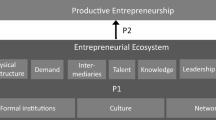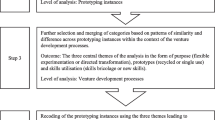Abstract
In modern societies entrepreneurship and innovation are widely seen as key sources of economic growth and welfare increases. Yet entrepreneurial innovation has also meant losses and hardships for some members of society: it is destructive of some stakeholders’ wellbeing even as it creates new wellbeing among other stakeholders. Both the positive benefits and negative externalities of innovation are problematic because entrepreneurs initiate new ventures before their private profitability and/or social costs can be fully recognized. In this paper we consider three analytical frameworks within which these issues might be examined: pre-commitments, contractarianism, and an entrepreneurial framework. We conclude that the intersection of stakeholder theory and entrepreneurial innovation is a potentially rich arena for research.
Similar content being viewed by others
References
Abrams J. J. 2002 Solution to the Problem of Induction: Peirce, Appel and Goodman on the Grue Paradox. Transactions of the Charles S. Peirce Society XXXVIII 4:543–558
Adler, J. H. and D. Simmons: 2003, Public Interest Comment on the OMB’s Draft 2003 Report to Congress on the Costs and Benefits of Federal Regulations (Mercatus Center, George Mason University). http://www.mercatus.org/
Akeroyd F. M. 1991 A Practical Example of Grue. The British Journal for the Philosophy of Science 42(4):535–539
Arrow K. J. 1951 Social Choice and Individual Values. New York: John Wiley and Sons
Arrow K. J., Fisher A. C. 1974 Environmental Preservation, Uncertainty and Irreversibility. Quarterly Journal of Economics 88(2):312–319
Boardman, W. S.: 1999, Notes on a Utilitarian Justification of Rights: The Strategy of Pre-Commitment. Posted April 24, 1999. www.lawrence.edu/fac/boardman/rights_ precommt.html
Buchanan J. M. 1975 A Contractarian Paradigm for Applying Economic Thinking. American Economic Review 65(2):225–230
Buchanan J. M., Vanberg V. J. 1991 The Market as a Creative Process. Economics and Philosophy 7:167–186
Buchholz R. A., Rosenthal S. B. 2005 The Spirit of Entrepreneurship and the Qualities of Moral Decision Making: Toward a Unifying Framework. Journal of Business Ethics 60(3): 307–315
Coase, R. H.: 1960, ‚The Problem of Social Cost’, Journal of Law and Economics (3): 1–44
Dennett D. (1984) Cognitive Wheels: The Frame Problem of AI. In: C. Hookway (ed.) Minds, Machines and Evolution. Cambridge, UK: Cambridge University Press
Dew, N.: 2003, Lipsticks and Razorblades: How the Auto ID Center used Pre-commitments to build The Internet of Things. Dissertation (University of Virginia, Charlottesville, VA)
Dew N., Velamuri S. R., Venkataraman S. 2004a Dispersed Knowledge and an Entrepreneurial Theory of the Firm. Journal of Business Venturing 19(5): 659–679
Dew N., Sarasvathy S. D., Ventakaraman S. 2004b The Economic Implications of Exaptation. Journal of Evolutionary Economics 14:69–84
Elster J. 1984 Ulysees and the Sirens. Cambridge: Cambridge University Press
Elster J. 2000 Ulysses Unbound: Studies in Rationality, Precommitment and Constraints. Cambridge, UK: Cambridge University Press
Fassin Y. 2005 The Reasons Behind Non-Ethical Behaviour in Business and Entrepreneurship. Journal of Business Ethics 60(3):265–279
Fodor J. A. 1983 The Modularity of the Mind. Cambridge, MA: MIT Press
Fodor J. A. 1987 Modules, Frames, Fridgeons, Sleeping Dogs, and the Music of the Spheres. In: Pylyshyn Z. W. (Ed.) The Robot’s Dilemma: The Frame Problem in Artificial Intelligence. Norwood, NJ: Ablex
Freeman R. E. 1984 Strategic Management: A Stakeholder Approach. New York: Pitman Publishing
Freeman, R. E.: 1994, `A Stakeholder Theory of the Modern Corporation: Kantian Capitalism', in T. L. Beauchamp and N. E. Bowie (eds.), Ethical Theory and Business (Prentice-Hall, Engelwood Cliffs, NJ), pp. 66–76
Freeman R. E., Pierce J., Dodd R. 2000 Environmentalism and the New Logic of Business. Oxford: Oxford University Press
Goodie A. S. 2003 The Effects of Control on Betting: Paradoxical Betting on Items of High Confidence with Low Value. Journal of Experimental Psychology 29(4):598–610
Goodman N. 1983 Fact, Fiction and Forecast. Cambridge, MA: Harvard University Press
Hall J., Rosson P. 2006 The Impact of Technological Turbulence on Entrepreneurial Behavior, Social Norms and Ethics: Three Internet-based Cases. Journal of Business Ethics 64(3): 231–248
Hannafey F.T. (2003) Entrepreneurship and Ethics: A Literature Review. Journal of Business Ethics 46: 99–110
Haugeland J. (1987). An Overview of the Frame Problem. In: Z. Pylyshyn (ed.) The Robot’s Dilemma: The Frame Problem in Artificial Intelligence. NY: Ablex
Hellmann, T.: 2000, ‚Entrepreneurship and the Process of Obtaining Resource Commitments’, Working Paper (Stanford University, CA)
Hirschman A. O. 1970 Exit, Voice and Loyalty. Cambridge: Harvard University Press
Joas H. 1996 The Creativity of Action. Chicago, The University of Chicago Press
Kareev Y. 1995 Through a Narrow Window: Working Memory Capacity and the Detection of Covariation. Cognition 56:263–269
Lee E. 2005 The Ethics of Innovation: p2p Software Developers and Designing Substantial Noninfringing Uses Under the Sony Doctrine. Journal of Business Ethics 62(2):147–162
Lormand E. 1990. Framing the Frame Problem. Synthese 82(3):353–374
Lupton S. 2005 Shared Quality Uncertainty and the Introduction of Indeterminate Goods. Cambridge Journal of Economics 29(3):399–421
McCarthy, P. and P. Hayes: 1969, `Some Philosophical Problems from the Standpoint of Artificial Intelligence', in B. Meltzer and D. Michie (eds.), Machine Intelligence 4 (Edinburgh University Press, Edinburgh, Scotland)
Mokyr, J.: 1996, ‚Innovation and its Enemies’, Working Paper (Department of Economics, Northwestern University)
Rawls J. 1971 A Theory of Justice. New York: Belknap Press
Rosenberg, N.: 1996, ‚Uncertainty and Technological Change’, in J. C. Fuhrer and J. Sneddon Little (eds.), Technology and Growth: Conference Series No.40. (Federal Reserve Bank of Boston, Boston)
Sah R. K., Stiglitz J. E. 1988 Committees, Hierarchies and Polyarchies. Economic Journal 98:451–470
Sandel, M.: 1982, Liberalism and the Limits of Justice (Cambridge University Press)
Sarasvathy, S. D.: 1998, `How do firms come to be? Towards a theory of the prefirm', Dissertation (Carnegie Mellon University, Pittsburg, PA)
Sarasvathy S. D. 2001 Causation and Effectuation: Toward a Theoretical Shift from Economic Inevitability to Entrepreneurial Contingency. Academy of Management Review 26(2):243–263
Sarasvathy, S. D.: 2006, Effectuation: Elements of Entrepreneurial Expertise (Edward Elgar)
Sarasvathy S. D., Dew N. 2005a New Market Creation Through Transformation. Journal of Evolutionary Economics 15: 533–565
Sarasvathy S. D., Dew N. 2005b Toward a Technology of Foolishness: Alternative Logics Embodied in Entrepreneurial Action. Scandinavian Journal of Management 21(4):385–406
Sen A. 1999b Development as Freedom. New York: Anchor
Skyrms B. 2004 The Stag Hunt and the Evolution of Social Structure. Cambridge, U.K.: Cambridge University Press
Stanford Encyclopedia of Philosophy: 2004, The Frame Problem. http://plato.stanford.edu/entries/frame-problem/Retrieved July 1, 2004
Sumner L. 1987 The Moral foundations of Rights. New York: Oxford University Press
Todd P. M., Gigerenzer G. 2003 Bounding Rationality to the World. Journal of Economic Psychology 24:143–165
Uzzi B. 1997 Social Structure and Competition in Interfirm Networks: The Paradox of Embeddedness Administrative Science Quarterly 42:35–67
Vandekerckhove W., Dentchev N. A. 2005 A Network Perspective on Stakeholder Management: Facilitating Entrepreneurs in the Discovery of Opportunities. Journal of Business Ethics 60(3): 221–232
Velamuri S. R., Venkataraman S. 2005 Why Stakeholder and Stockholder Theories are not Necessarily Contradictory: A Knightian Insight. Journal of Business Ethics 61(3): 249–262
Venkataraman, S.: 2002, ‚Stakeholder Value Equilibration and the Entrepreneurial Process’, Business Ethics Quarterly, Ruffin Series #3
Wempe J. 2005 Ethical Entrepreneurship and Fair Trade. Journal of Business Ethics 60(3): 211–220
Werhane P. H. 1999 Moral Imagination and Management Decision-Making. Oxford: Oxford University Press
Wiltbank, R., N. Dew, S. D. Sarasvathy and S. Read: 2006, ‚What To Do Next? The Case for Non-Predictive Strategies’, Strategic Management Journal 27(10), 981–998
Witt U. 1996 Innovations, Externalities and the Problem of Economic Progress. Public Choice 89(1–2): 113–130
Author information
Authors and Affiliations
Corresponding author
Additional information
Nicholas Dew, Ph.D. is an assistant professor at the Naval Postgraduate School in Monterey, CA. He teaches strategic management in private and public sector organizations. His research interests include entrepreneurship, strategy and innovation. He has published in several scholarly journals, including Strategic Management Journal, the Journal of Business Venturing, Industrial and Corporate Change and the Journal of Evolutionary Economics.
Saras D. Sarasvathy, Ph.D. is an associate professor at the Darden Graduate School of Business Administration. She teaches courses in entrepreneurship and ethics in Darden's MBA and doctoral programs. Her research focuses on the cognitive basis for high-performance entrepreneurship. She has published in various scholarly journals, including the Academy of Management Review, Strategic Management Journal, the Journal of Businesss Venturing and the Journal of Evolutionary Economics. Her first book Effectuation: Elements of Entrepreneurial Expertise was recently published by Edward Elgar.
Rights and permissions
About this article
Cite this article
Dew, N., Sarasvathy, S.D. Innovations, Stakeholders & Entrepreneurship. J Bus Ethics 74, 267–283 (2007). https://doi.org/10.1007/s10551-006-9234-y
Received:
Accepted:
Published:
Issue Date:
DOI: https://doi.org/10.1007/s10551-006-9234-y




